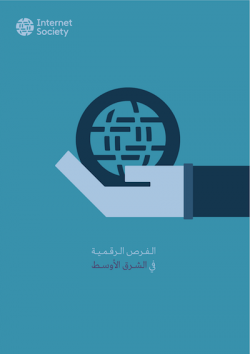Preface
The Middle East (ME) is an incredibly diverse region with over 350 million people with widely varying states of Internet access and digital readiness. Using research created by the Internet Society, ESCWA, and Wamda, this booklet shows what positive and practical steps can be taken to increase digital opportunity and spread its benefits to all of society.
All countries in the region share some Internet-related factors – a high youth population with accompanying challenges for education and employment, a fairly low level of local content including content in Arabic, and a shared language. The ME has huge and largely untapped markets for online activity, and a good chance to develop its own thriving ecosystem of infrastructure, content and services. The ME has many unique cultures that need to take their own place online, so that the global Internet better represents all the people of the world. Although there are challenges to be met, the outlook is very positive, as long as countries in the region act quickly and purposefully to ensure the Internet creates digital opportunity for all.
The most important take-away from this guide, is that the biggest potential gains come not just from digital start-ups, or is just available in urban areas, and are not just reserved for the most educated. The biggest potential gains come from making the whole of the economy digital and taking practical steps to make sure no one is left behind.
This booklet is intended to continue the conversation amongst stakeholders – government, business, technology experts and society as a whole – in the region. By looking clearly at both the opportunities and threats that are specific to the Middle East, it charts a pro-active path to achieving digital opportunity for the many, building more diverse economies.
The key to success will be an open dialogue on how to adopt the recommendations that work best for each country, and to implement them, working with all relevant stakeholders.
Introduction
Digital opportunity means successfully using the Internet and its associated technologies to create social and economic opportunity for all. There is huge potential for digital opportunity to drive sustainable economic growth in the ME for its young population as long as they are suitably educated, and the labour market is prepared to harness their energy and skills. But digital opportunity isn’t just for the young. It is essential to make sure people already in the workforce have the right skills to adapt to social and economic change.
There are 3 main reasons why people who are not yet connected remain online:
- lack of access
- lack of skills
- lack of interest
This booklet looks at each of these challenges, and shows the huge potential and many opportunities available to governments, business, and technology leaders in dealing with them.
More than half of the people in the ME are already online (though with much variation between countries). Outside of the Gulf Cooperation Council (GCC) states, GDP is relatively low, and Internet access rates tend to track overall economic development quite closely. The Gulf Arab states, Jordan, Lebanon, Palestine and Tunisia have more than half of their populations online already, while in the rest of the region, more than half of the population is not yet online. Those already online tend to be more educated, more a fluent and more likely to speak some English than most others in their countries. Lack of access means the many, often rural, areas where there is no Internet access at all. But it also means connectivity that is too expensive compared to median incomes, unreliable, or not fast enough to do more than very basic activities.
Lack of skills means lack of digital literacy – being able to navigate online, use services and to access and interpret content – and also basic literacy, for the parts of the population whose literacy is low or even non-existent. In the broader sense, it means access to life long education and the acquisition of twenty first century skills through the education system.
By lack of interest, we mean gaps in locally relevant content – news, services, opportunities for interaction – and a lack of local language content, too.


